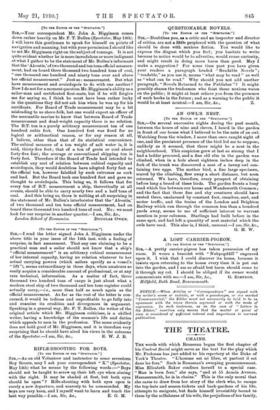(To THR EDITOR OF THE " SPECTATOR. "] SIE, — Your correspondent Mr.
John A. Higginson comes down rather heavily on Mr. F. T. Bullen (Spectator, May 14th). I will leave this gentleman to speak for himself on points of navigation and manning, but with your permission I should like to set Mr. Higginson right on the subject of tonnage. It is not quite evident whether he is more incredulous or more indignant at what I gather to be the statement of Mr. Bullen's informant that the `Alcestis,' of two thousand and ten tons official measure- ment, had on board three thousand two hundred tone of coal, " one thousand one hundred and ninety tons over and above her official measurement." Just so : measurement. But what have measurement and avoirdupois to do with one another P Now I do not for a moment question Mr. Higginson's ability as a sailor-man and certificated first-mate, but if he will forgive me for saying so, I think he must have been rather lucky in the questions they did not ask him when he was up for his certificate. For Board of Trade measurement may be a bit misleading to us shore-folk, but one would expect an officer of the mercantile marine to know that between Board of Trade measurement and dead-weight capacity there is no relation. The B.T. ton is a purely arbitrary measurement ton of one hundred cubic feet. One hundred feet was fixed for no logical or arithmetical reason, or for• any reason at all, I believe, other than that of its statistical convenience. The cubical measure of a ton weight of salt water is, it is said, thirty-five feet ; that of a ton of grain or coal about forty-five feet; the average or conventional shipping ton is forty feet. Therefore if the Board of Trade had intended to establish any sort of relation between cubical capacity and avoirdupois, they would doubtless have adopted forty feet as the official ton, however falsified by such extremes as cork and lead. But the Board took one hundred feet and gave no thought to avoirdupois. This being so, it follows that for every ton of B.T. measurement a ship, theoretically at all events, should be able to carry nearly two and a half tons of coal. And this being so, there is nothing at all surprising in the statement of Mr. Bullen's interlocutor that the Akestis,' of two thousand and ten tons official measurement, had on board three thousand two hundred tons of coal. No ; we must look for our• surprise in another quarter.—I am, Sir, 8ro.,






































 Previous page
Previous page